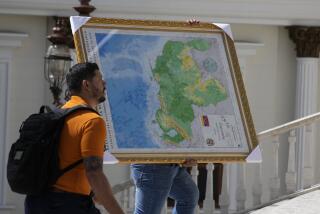Sandinistas Down Rebel Cargo Plane : SAM-7 Missiles Hit Craft Carrying 8, Managua Says
- Share via
MANAGUA, Nicaragua — Sandinista forces shot down a cargo plane after it dropped war materiel to U.S.-backed guerrillas inside Nicaragua, government and rebel officials said Sunday.
The DC-6 aircraft, with eight crewmen aboard, was hit by two SAM-7 missiles in southeastern Nicaragua after dark Saturday, Lt. Col. Roberto Calderon, a senior Sandinista army commander, told reporters at the crash scene.
Calderon said Sandinista militiamen captured one crewman who had parachuted from the plane and found the bodies of four others in the wreckage about 23 miles east of San Carlos. The other three were being hunted in the jungle area near the Costa Rican border, 125 miles southeast of Managua.
Night Parachute Drops
It was the first Contra supply plane downed since October, 1986. Since then, the rebels have gained the initiative in the war by using CIA-supervised night parachute drops to keep about 10,000 troops inside Nicaragua replenished with ammunition, medicine, uniforms, boots, food and cash.
Western military specialists said the plane’s downing did not seem to pose a wider threat to the Contra flights. Portable missiles like the SAM-7, long part of the Sandinista arsenal, have been largely ineffective against aircraft because they are not guided by radar.
Even so, President Daniel Ortega called the incident a setback for the Reagan Administration’s policy of aiding the Contras.
In a speech to a cattlemen’s meeting here, Ortega warned President Reagan: “Just as this plane has been shot down by our combatants, your policy has been shot down, has been destroyed. Even if (Congress) votes for new funds, they are not going to defeat our revolution.”
Captured Crewman Seen
The captured crewman, identified as Alejandro Sanchez Herrera, was presented to reporters who were flown to the crash site Sunday. He said the supply flight was his eighth in five weeks from a CIA-run base on Swan Island, Honduras.
Ortega called the crewman’s testimony “clear proof” that Honduras is violating a Central American peace accord banning use of its territory by insurgents.
Bosco Matamoros, a Contra spokesman, said the downed plane was owned by the rebel movement, but he would not comment on its point of origin. He said the rebel supply flights will continue.
Matamoros and other rebel spokesmen said the plane went down after dropping munitions and non-lethal supplies to a rebel battalion near Nueva Guinea, about 35 miles north of the crash site. They said all crewmen aboard were Nicaraguans.
But the captured crewman said the plane’s pilot was Colombian.
Hasenfus Capture Recalled
In October, 1986, the downing of a rebel cargo plane with a portable missile led to the capture of Eugene Hasenfus, an American whose testimony exposed a large-scale, U.S.-organized rebel supply network that used bases in Honduras and El Salvador, even though Congress had suspended such aid in 1984.
Since late 1986, when U.S. aid to the rebels became legal again, rebel spokesmen have reported more than 350 successful airdrops to their troops. The Nicaraguan defense minister says the drops have quickened since the peace accord was signed five months ago in order to help the rebels stockpile arms in case Congress cuts off their aid again.
Congress is to vote next week on an Administration request for substantial new Contra aid. Seeking to head off its approval, Nicaragua last week lifted a state of emergency and agreed to hold face-to-face cease-fire talks with Contra leaders starting this Thursday.
Indian Leader in Managua
Meanwhile, Miskito Indian leader Brooklyn Rivera arrived in Managua from Costa Rican exile Saturday night to open talks with the government on how to end a rebellion by 2,400 Indian guerrilla fighters and bring home 30,000 refugees to Nicaragua’s isolated Atlantic coastal region.
The talks with Interior Ministry officials are to start today at the Moravian Church in Managua, under the mediation of church leaders. Interior Minister Tomas Borge said Saturday that the agenda will be open to any subject.
Rivera is seeking local self-rule and collective ownership of the coastal region’s natural resources for Miskito Indians and four other indigenous minorities.
“If we make progress on these points, then we can discuss the cease-fire,” he said. The talks are complicated because two other Indian rebel leaders, Steadman Fagoth and Wycliffe Diego, oppose having them now and refuse to be bound by any settlement.
More to Read
Sign up for Essential California
The most important California stories and recommendations in your inbox every morning.
You may occasionally receive promotional content from the Los Angeles Times.













